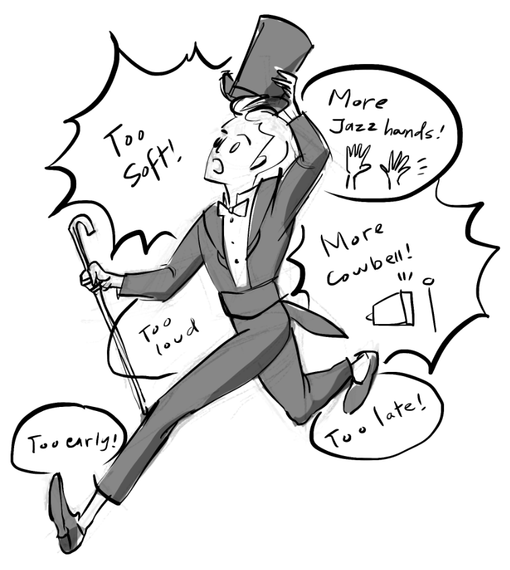One of my closest, most ridiculously-talented friends, Jonathan, gave me the best feedback on feedback I've ever received. As a professional singer and actor currently crushing it on Broadway, Jonathan is barraged with pointed feedback daily: too loud, too soft, too early, too late, less jazz hands, more cowbell, etc. In the hyper-competitive entertainment industry, these opportunities for micro-improvements can mean the difference between landing a Broadway role or playing the pan flute for spare change. In many ways, Jonathan's success hinges on his ability to hear and act upon the feedback that's given. A big part of this involves making people more comfortable giving him more and better feedback than the next guy.
What's his secret? Whenever Jonathan is given feedback, no matter how off-base or poorly-delivered, he always responds with "Thank you." This response puts the person giving feedback at ease, increasing the chances they'll give more feedback down the line while shifting Jonathan's mental state from a place of defensiveness to one of openness and humility. This gives Jonathan an edge in an industry overrun with ego.
The role of receiving feedback is often understated in the business world. So much advice focuses on giving feedback, from when (immediately after an incident) to where (a neutral location where everyone feels at ease) to how (wedged between compliments, a la "crap sandwich"). But the receiver is the true gatekeeper of the exchange, responsible not only for what's heard, but also for how much the other person says.
Jonathan's strategy of always thanking the feedback giver is an easy way to improve the quality and quantity of feedback he receives. Here are a few others I've picked up:
- Repeat the feedback in your own words: Reiterating feedback makes the person giving you feedback feel valued; it's also a tried-and-true strategy for internalizing what you've heard.
- Don't be defensive: When receiving critical feedback, it's natural to want to explain yourself and how you've been misperceived. But these explanations and justifications come at a cost, often in the form of less sincere or substantive feedback down the line. To avoid this temptation, only ask clarifying questions in the initial feedback session. In situations where you think the feedback is truly misinformed and off-base, only express this to the person after giving yourself at least a night or two to digest and reflect. Perhaps more importantly, however, remember that all feedback is valuable and has a kernel of truth, if only in the mind of that other person. With this framing, all feedback is valid and valuable, so assume best intent and listen with an open mind.

- Schedule followups: If you truly value someone's feedback (and actually want to improve), schedule a followup discussion a couple weeks after your initial meeting. Once this time has passed (and ideally after making a good-faith effort to improve), solicit additional feedback: "Have you noticed any changes since we touched base?" "What could I be doing better?"
- Communicate moments of improvement: When coming from the right place, giving feedback is making an investment in another person. Communicating moments of improvement as a result of someone's feedback illustrates their investment is paying off and will increase their likelihood of investing in you in the future. "Ever since our chat, I think I've been doing a lot better with X" or "Thanks to your feedback, I've noticed a big change in Y" can go a long way towards reinforcing the feedback giver and deepening the relationship.
Giving feedback is often difficult and uncomfortable, and the receiver has a clear choice every time they're approached: exacerbate the discomfort and train the giver to avoid similar exchanges in the future, or reinforce the giver and make them feel valued and heard. The collective intelligence of your team or organization will almost always surpass your own, and being a thoughtful and intentional feedback receiver will allow you to be empowered, rather than encumbered, by this incredible resource.
